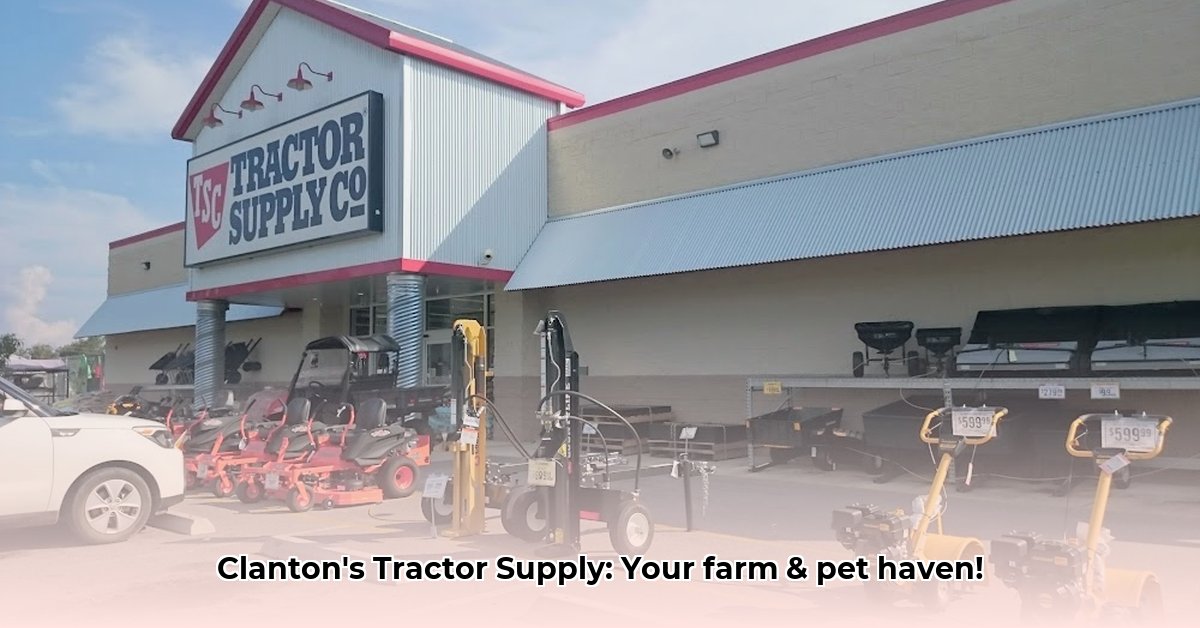
Tractor Supply's Role in Clanton's Rural Economy
Tractor Supply Company (TSC) in Clanton, Alabama, serves as a vital hub for the community's agricultural and pet-owning needs. Its location and product diversity contribute significantly to the local economy and the practices of sustainable agriculture. But how does this seemingly simple retail presence impact Clanton's daily life? Let's examine the factors contributing to TSC's success and its impact on the community. For more information on nearby TSC locations, check out the Alex City store.
A Comprehensive Rural Retail Solution
TSC offers a wide array of products and services catering to the specific demands of rural life. From livestock feed and farm equipment to gardening supplies and pet food, the store functions as a one-stop shop, eliminating the need for residents to travel to multiple locations. This convenience significantly improves efficiency for busy farmers and homeowners alike. "The store's centralized location saves us hours each week," says Sarah Miller, a local farmer. "Getting everything I need in one place makes a huge difference in my schedule."
Strategic Location: A Key to Success
The strategic placement of the Clanton TSC store is crucial to its success. Situated for convenient access within the community, it minimizes travel time for customers, especially those purchasing bulky or heavy items. This accessibility is a significant factor in customer loyalty. The ease of access is particularly helpful for farmers and ranchers dealing with large quantities of supplies. This accessibility directly contributes to the store's efficiency and convenience.
Adapting to Local Needs: An Understanding of the Community
TSC's success in Clanton hinges on its understanding of local agricultural practices and consumer preferences. By carefully observing local crop cycles, livestock types, and seasonal demands, the store tailors its inventory accordingly. This responsive approach ensures that the products available directly address the community's needs. "They really understand our farming practices here," adds Miller. "Their stock always aligns with what we need throughout the year."
Building Community Through Engagement
TSC goes beyond simply selling products; it actively cultivates relationships with the Clanton community. Participation in local events, agricultural workshops, and collaborations with organizations like 4-H clubs foster strong community ties and enhance brand loyalty. This community involvement builds trust and establishes TSC as more than just a retail store. "Their commitment to the community is evident," states Mayor Jeff Mims of Clanton. "They're not just a business; they're active participants in our town's success."
Future Challenges and Opportunities
TSC faces ongoing challenges, including fluctuating agricultural demands, competition from online retailers, potential supply chain disruptions, and evolving consumer preferences. However, these challenges also present opportunities for growth. Dynamic inventory management, enhanced in-store experiences, diversified supply chains, and an increased focus on sustainable and organic products, will ensure continued success.
Promoting Sustainability at TSC: A Framework for Rural Locations
While specific data on TSC's sustainability initiatives isn't readily available, a hypothetical framework for improving its environmental impact in rural areas can be outlined. This framework focuses on key areas for improvement and measurable progress.
A Multi-pronged Approach to Sustainability
To effectively enhance sustainability, a holistic approach is needed, addressing key areas:
Energy Efficiency: Transitioning to renewable energy sources (solar panels), upgrading to energy-efficient lighting and HVAC systems, and improving building insulation can significantly reduce energy consumption.
Waste Reduction: Implementing comprehensive recycling programs, reducing packaging materials, and promoting reusable containers among customers are key steps in reducing waste.
Sustainable Sourcing: Prioritizing products from sustainably managed sources (organic seeds, sustainably harvested lumber) and partnering with local farmers using eco-friendly practices are essential for minimizing environmental impact.
Transportation Optimization: Improving delivery efficiency through consolidated shipments and exploring eco-friendly transportation options (electric or biofuel vehicles) are vital for reducing carbon emissions.
Community Engagement: Collaborating with local agricultural organizations and educating community members on sustainable farming practices through workshops and educational events help build a culture of sustainability.
Employee Training: Educating employees about sustainable practices fosters an environmentally conscious culture, maximizing the impact of these initiatives.
Measuring Success: Tracking key performance indicators (KPIs) such as energy consumption, waste diversion rates, the percentage of sustainably sourced products, and customer satisfaction with sustainability initiatives is crucial for evaluating progress and making necessary adjustments. Regular monitoring allows for continuous improvement and ensures long-term success in meeting sustainability goals.
The future success of Tractor Supply in Clanton and other rural locations depends on its ability to adapt to changing consumer needs and proactively adopt sustainable practices. The store’s integration into the community, along with a forward-looking approach to sustainability, indicates a promising future.